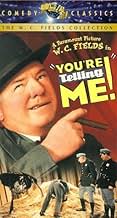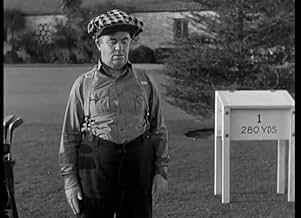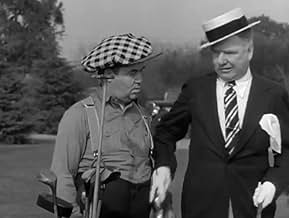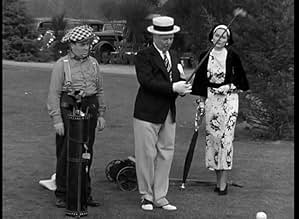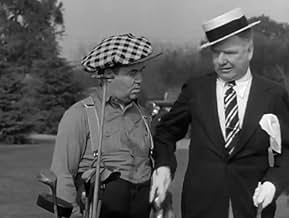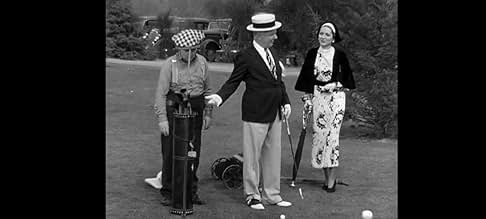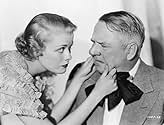IMDb-BEWERTUNG
7,4/10
1253
IHRE BEWERTUNG
Füge eine Handlung in deiner Sprache hinzuA hard-drinking, socially-awkward inventor wrecks his daughter's chances of marriage into a rich family and bungles his own chances of success by selling one of his more practical inventions... Alles lesenA hard-drinking, socially-awkward inventor wrecks his daughter's chances of marriage into a rich family and bungles his own chances of success by selling one of his more practical inventions.A hard-drinking, socially-awkward inventor wrecks his daughter's chances of marriage into a rich family and bungles his own chances of success by selling one of his more practical inventions.
- Auszeichnungen
- 1 wins total
Buster Crabbe
- Bob Murchison
- (as Larry 'Buster' Crabbe)
Dell Henderson
- Mayor
- (as Del Henderson)
Robert McKenzie
- Charlie Bogle
- (as Robert Mc Kenzie)
William Bailey
- Tire Company Executive
- (Nicht genannt)
Eddie Baker
- First Motorcycle Cop
- (Nicht genannt)
Dorothy Bay
- Mrs. Kendall
- (Nicht genannt)
Harold Berquist
- Doorman
- (Nicht genannt)
Don Brodie
- Waiter
- (Nicht genannt)
Elise Cavanna
- Sarah Smith - Female Gossip
- (Nicht genannt)
Empfohlene Bewertungen
10gregvw
This is one of the funniest films I've ever seen. Fields stars as Sam Bisbee a liquor-loving inventor who is trying to sell his puncture-proof (actually bullet-proof) tires to a major corporation. The son of a wealthy socialite proposes to Bisbee's daughter, only to be foiled by his mother when she encounters the uncouth Bisbee. On top of ruining his daughter's potential marriage, Sam also loses his car and several other inventions and mistakenly shoots the tires of a police car. The resolution involves a princess, Bisbee running down mainstreet with an ostrich on a rope, and a classic Fieldsian attempt at hitting a golf ball (which somehow results in a pie getting stuck to his hat.)
Do yourself a favor and see this movie!
Do yourself a favor and see this movie!
In the few W. C. Fields movies that I've seen, he doesn't disappoint. I can now add to that "You're Telling Me!", wherein he plays an optometrist-inventor whose daughter's marriage plans get complicated by her fiance's mother's snobbish attitude. The protagonist's attempt to show his latest invention to some execs further complicates things. More zaniness follows.
It's not any sort of profound movie, and doesn't try to be. It's just funny. Fields, despite his personal problems, always managed to be entertaining. You're sure to like this one.
It's not any sort of profound movie, and doesn't try to be. It's just funny. Fields, despite his personal problems, always managed to be entertaining. You're sure to like this one.
10Tashtago
It's amazing how much got squeezed into this 66 minute film. "You're Telling Me" contains some of Fields best work. The golf routine at the end is classic, although a little shorter than in the previously filmed "the Golf Specialist" which features a different and even more revolting caddy. What I noticed on seeing this film again after many years is what a good actor Fields is, especially in the scene where he talks the princess out of suicide. The supporting cast is also very good especially the aforementioned Kathleen Howard. No other comedian could get away with the scene where Fields knocks himself out with one of his inventions and two scenes later is still unconscious. As a Fields fan this a 10. Favorite line: "Your alright Mayor, I voted for you in the last election...five times."
Does anyone out there know where I can find a copy of "Man on the Flying Trapeze" ? Any information is much appreciated.
Does anyone out there know where I can find a copy of "Man on the Flying Trapeze" ? Any information is much appreciated.
You're Tellling Me finds W.C. Fields pitted against the world again, the immediate world and the outside world. And Fields fights it with the weapons of his choice, rye or gin. You're Telling Me actually does get a bit serious for a while.
He's Sam Bisbee in this film, ne'er do well optometrist and full time henpecked husband of Louise Carter and father of Joan Marsh. Joan would like to marry Buster Crabbe who's the son of the town's leading snob Kathleen Howard, but it looks hopeless.
Fields's one love besides his family and booze is inventing things. He actually may have something in a puncture proof tire. But in a demonstration where he shoots the tires of a police car it gets him in some trouble.
Here's actually where this Fields comedy takes a serious turn. He's actually contemplating suicide on the way back home on the commuter train, but then seeing a young lady Adrienne Ames in distress and contemplating the same thing, he talks her and ironically himself out of it. She turns out to be his guardian angel in many ways and turns the tide for new friend socially and economically.
This was first the first film Fields did with Kathleen Howard. Someone at Paramount must have seen something because the following year they were teamed as husband and wife in It's A Gift. She became Fields's Margaret Dumont in that one.
You're Telling Me is the film where Bill Fields got do his golf routine which is almost as famous as his pool shark specialty. It comes at the end of the film where a contrite town who just thought of him as the town drunk, now asks him to open their new country club. It's still holds very well today and a source of amusement for duffers everywhere.
In fact the whole film is as amusing as it was when it premiered in 1934. The comedy of W.C. Fields is timeless.
He's Sam Bisbee in this film, ne'er do well optometrist and full time henpecked husband of Louise Carter and father of Joan Marsh. Joan would like to marry Buster Crabbe who's the son of the town's leading snob Kathleen Howard, but it looks hopeless.
Fields's one love besides his family and booze is inventing things. He actually may have something in a puncture proof tire. But in a demonstration where he shoots the tires of a police car it gets him in some trouble.
Here's actually where this Fields comedy takes a serious turn. He's actually contemplating suicide on the way back home on the commuter train, but then seeing a young lady Adrienne Ames in distress and contemplating the same thing, he talks her and ironically himself out of it. She turns out to be his guardian angel in many ways and turns the tide for new friend socially and economically.
This was first the first film Fields did with Kathleen Howard. Someone at Paramount must have seen something because the following year they were teamed as husband and wife in It's A Gift. She became Fields's Margaret Dumont in that one.
You're Telling Me is the film where Bill Fields got do his golf routine which is almost as famous as his pool shark specialty. It comes at the end of the film where a contrite town who just thought of him as the town drunk, now asks him to open their new country club. It's still holds very well today and a source of amusement for duffers everywhere.
In fact the whole film is as amusing as it was when it premiered in 1934. The comedy of W.C. Fields is timeless.
As the film opens, it's late at night and we see an inebriated W.C. Fields slowly making his way up the walkway to his front door; as he moves along, he staggers off the path and has an encounter with a tree limb that raises havoc with his straw hat and knocks it off, which gives Fields-- the all-time master of physical comedy-- a field upon which to ply his craft to the fullest. He makes the simple task of refitting chapeau to pate engagingly hilarious. And once he makes it into the house (shoes in hand, of course, but too late!-- the little woman is waiting for him), it's more of the same, beginning with an encounter with some draperies, this time. It's classic Fields schtick, and what a great way to kick off one of his lesser known, but vibrantly funny films, `You're Telling Me,' directed by Erle C. Kenton.
Pauline Bisbee (Joan Marsh) and Bob Murchison (Buster Crabbe) are in love, and want to be married; but there's a snag: The Bisbee house is located on the `wrong' side of the tracks, and the union is meeting strong resistance from Bob's mother, Mrs. Edward Quimby Murchison (Kathleen Howard), who is ever discerning of the Murchison's place in society. And Pauline's father, Sam (Fields), is of little help. An inveterate dreamer, Sam is an inventor, and though he knows it's only a matter of time before the world beats a path to his door, his time, unfortunately, has not yet come, which leaves him in the quagmire of anonymity, and his family still on the wrong side of the tracks.
All of that is about to change, however, because Sam has at last invented something that will assure him fortune and fame: A 1000% puncture-proof automobile tire. He has an appointment in the city with a tire company, and once they see his demonstration, he knows his future will be made, Pauline will be able to marry Bob, and all will be well.
Alas, the demonstration goes awry, and the hapless Sam, dejected, disgraced and alone, boards a train for home. He thinks it's the end; but on the train, he befriends a beautiful young woman, unaware that she is a foreign dignitary, the Princess Lescaboura (Adrienne Ames), currently on a goodwill tour of America. And it turns out to be an auspicious encounter, as Sam's kindness to her is about to be repaid in a way that will change his life forever.
This film is vintage W.C. Fields, featuring all of the trademark elements that make him (and his films) so endearing and enduring, even today: The sight gags, presented in that unique Fields' way; Fields as the underdog; the innate cynicism Fields honed into a veritable art form; Fields as the hen-pecked husband (a role he played often, and perfected in `It's A Gift,' made this same year-- 1934-- with Kathleen Howard as his wife); the witty retorts; and, of course, the genuine humor. In one respect, however, this film differs from most of his others, in that, as Sam, Fields displays a gentler side of his usually caustic nature. The acerbity is present, to be sure, but toned down; and Sam, perhaps more than any character Fields ever created, is genuinely likable.
As Bob Murchison, Buster Crabbe's performance leaves something to be desired, but that charismatic spark that would make him a matinee idol later in the Sci-fi serials `Flash Gordon' and `Buck Rogers,' and later in numerous `Billy the Kid' and `Billy Carson' westerns, is evident, and most importantly, he does well enough to set the stage for the antics of the film's star.
In only her second film, Kathleen Howard is a delight in the role of Mrs. Murchison, who is something of a prototype for many who would come later in other films, such as Eulalie Mackechnie Shinn of Meredith Willson's `The Music Man.' As Bob's domineering mother, she affects an aloofness that strikes just the right chord and makes her the perfect foil for the down-to-earth Sam Bisbee.
The supporting cast includes Louise Carter (Bessie Bisbee), Tammany Young (Caddy), Dell Henderson (Mayor), James B. `Pop' Kenton (Doc Beebe), Robert McKenzie (Charlie Bogle), Nora Cecil (Mrs. Price), George Irving (Mr. Robins) and Frederick Sullivan (Mr. Edward Quimby Murchison). Comparatively short (at 66 minutes), `You're Telling Me' is nevertheless something of a minor classic and pure Fields from start to finish. Thoroughly enjoyable and highly entertaining, It even gives the inimitable W.C. a chance to perform a bit of his famous `golf' routine. A funny, and often downright hilarious film, it's a showcase for one of cinema's premiere funny men, and in the end, more than anything else, one thing is certain: It's going to make you laugh. And that's the magic of the movies. I rate this one 9/10.
Pauline Bisbee (Joan Marsh) and Bob Murchison (Buster Crabbe) are in love, and want to be married; but there's a snag: The Bisbee house is located on the `wrong' side of the tracks, and the union is meeting strong resistance from Bob's mother, Mrs. Edward Quimby Murchison (Kathleen Howard), who is ever discerning of the Murchison's place in society. And Pauline's father, Sam (Fields), is of little help. An inveterate dreamer, Sam is an inventor, and though he knows it's only a matter of time before the world beats a path to his door, his time, unfortunately, has not yet come, which leaves him in the quagmire of anonymity, and his family still on the wrong side of the tracks.
All of that is about to change, however, because Sam has at last invented something that will assure him fortune and fame: A 1000% puncture-proof automobile tire. He has an appointment in the city with a tire company, and once they see his demonstration, he knows his future will be made, Pauline will be able to marry Bob, and all will be well.
Alas, the demonstration goes awry, and the hapless Sam, dejected, disgraced and alone, boards a train for home. He thinks it's the end; but on the train, he befriends a beautiful young woman, unaware that she is a foreign dignitary, the Princess Lescaboura (Adrienne Ames), currently on a goodwill tour of America. And it turns out to be an auspicious encounter, as Sam's kindness to her is about to be repaid in a way that will change his life forever.
This film is vintage W.C. Fields, featuring all of the trademark elements that make him (and his films) so endearing and enduring, even today: The sight gags, presented in that unique Fields' way; Fields as the underdog; the innate cynicism Fields honed into a veritable art form; Fields as the hen-pecked husband (a role he played often, and perfected in `It's A Gift,' made this same year-- 1934-- with Kathleen Howard as his wife); the witty retorts; and, of course, the genuine humor. In one respect, however, this film differs from most of his others, in that, as Sam, Fields displays a gentler side of his usually caustic nature. The acerbity is present, to be sure, but toned down; and Sam, perhaps more than any character Fields ever created, is genuinely likable.
As Bob Murchison, Buster Crabbe's performance leaves something to be desired, but that charismatic spark that would make him a matinee idol later in the Sci-fi serials `Flash Gordon' and `Buck Rogers,' and later in numerous `Billy the Kid' and `Billy Carson' westerns, is evident, and most importantly, he does well enough to set the stage for the antics of the film's star.
In only her second film, Kathleen Howard is a delight in the role of Mrs. Murchison, who is something of a prototype for many who would come later in other films, such as Eulalie Mackechnie Shinn of Meredith Willson's `The Music Man.' As Bob's domineering mother, she affects an aloofness that strikes just the right chord and makes her the perfect foil for the down-to-earth Sam Bisbee.
The supporting cast includes Louise Carter (Bessie Bisbee), Tammany Young (Caddy), Dell Henderson (Mayor), James B. `Pop' Kenton (Doc Beebe), Robert McKenzie (Charlie Bogle), Nora Cecil (Mrs. Price), George Irving (Mr. Robins) and Frederick Sullivan (Mr. Edward Quimby Murchison). Comparatively short (at 66 minutes), `You're Telling Me' is nevertheless something of a minor classic and pure Fields from start to finish. Thoroughly enjoyable and highly entertaining, It even gives the inimitable W.C. a chance to perform a bit of his famous `golf' routine. A funny, and often downright hilarious film, it's a showcase for one of cinema's premiere funny men, and in the end, more than anything else, one thing is certain: It's going to make you laugh. And that's the magic of the movies. I rate this one 9/10.
Wusstest du schon
- WissenswertesFields' character Bisbee describes a possible scenario involving catching burglars in the basement and drinking with them, a scenario that would be played out in a later film, Man on the Flying Trapeze (1935).
- PatzerRosita is brushing Princess Lescaboura's nails and after Rosita says, "But you must.", the Princess' hands are under the table.
- Zitate
Sam Bisbee: It's a funny ol' world... Man's lucky if he gets out of it alive.
- VerbindungenReferences Der Scheich (1921)
Top-Auswahl
Melde dich zum Bewerten an und greife auf die Watchlist für personalisierte Empfehlungen zu.
- How long is You're Telling Me!?Powered by Alexa
Details
- Laufzeit
- 1 Std. 6 Min.(66 min)
- Farbe
- Seitenverhältnis
- 1.37 : 1
Zu dieser Seite beitragen
Bearbeitung vorschlagen oder fehlenden Inhalt hinzufügen

